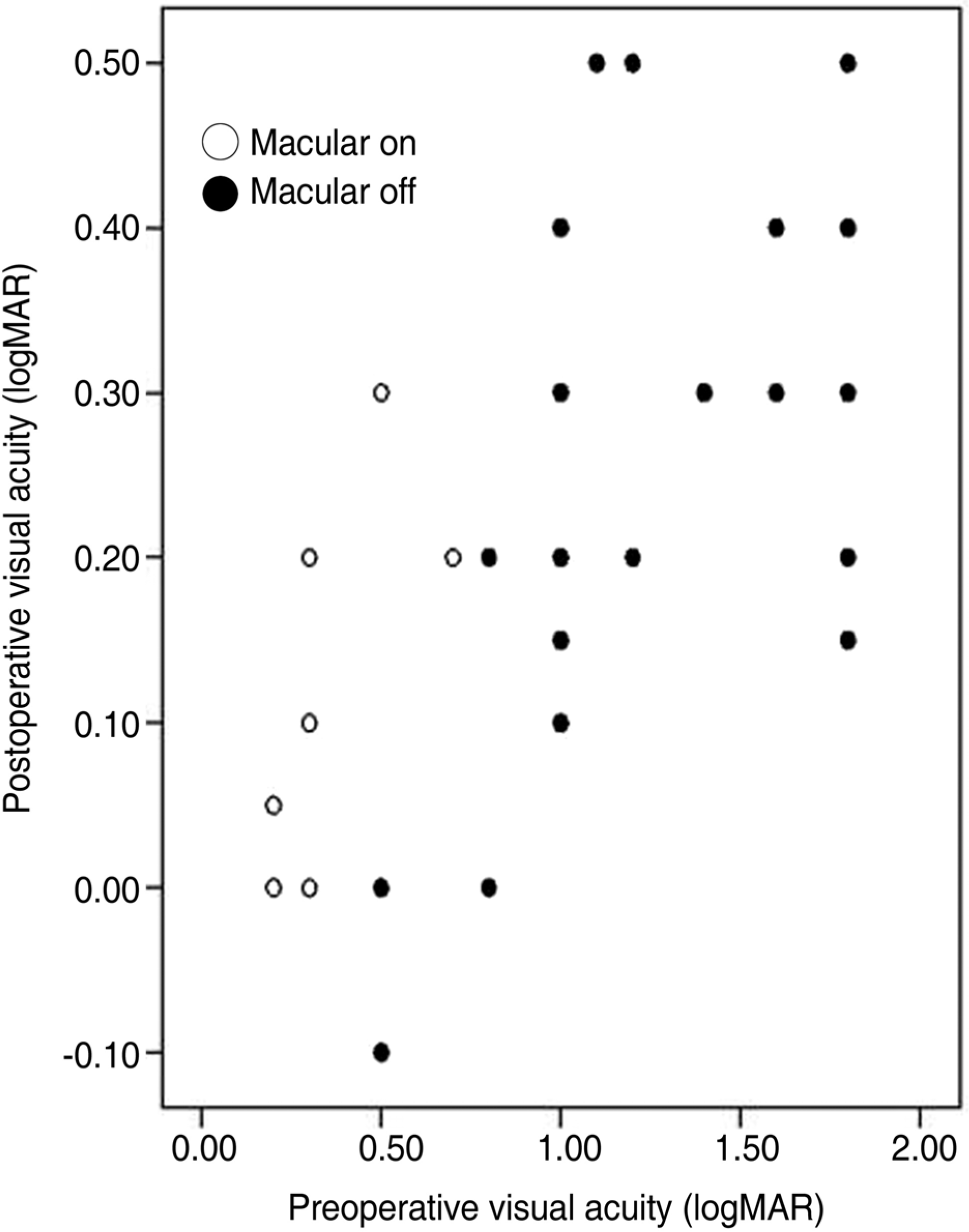Abstract
Purpose
To report the results of primary pars plana vitrectomy with 360-degree endolaser photocoagulation for pseudophakic rhegmatogenous retinal detachment.
Methods
We retrospectively reviewed the medical records of 35 eyes of 35 patients who hadundergone vitrectomy without scleral bucking as a primary operation for pseudophakic rhegmatogenous retinal detachment with a followup period of more than 12 months. We also analyzed the anatomical success rate and the patients’ final visual acuities. In all patients, endolaser photocoagulation was applied to the retinal tears, as well as to 360-degrees of the peripheral retina, using a curved illuminating endolaser probe intraoperatively.
Results
The mean patient age was 61 years, and the mean followup period was 20 months. The mean preoperative visual acuity (logMAR) was 1.06, while the mean postoperative visual acuity (logMAR) was 0.23. Twenty-four (69%) of the 35 patients showed macular detachment, and 34 (97%) of the 35 eyes experienced retinal reattachment and visual improvement after a single operation. Complications included epiretinal membrane (6%) and cystoid macular edema (3%).
Go to : 
References
1. Javitt JC, Vitale S, Canner JK, et al. National outcomes of cataract extraction I. Retinal detachment after inpatient surgery. Ophthalmology. 1991; 98:895–902.
3. Yoshida A, Ogasawara H, Jalkh AE, et al. Retinal detachment after cataract surgery. Predisposing factors. Ophthalmology. 1992; 99:453–9.
4. Ho PC, Tolentino FI. Pseudophakic retinal detachment. Surgical success rate with various types of IOLs. Ophthalmology. 1984; 91:847–52.
6. Norton EW. Retinal detachment in aphakia. Trans Am Ophthalmol Soc. 1963; 61:770–89.
7. Ho PC, Tolentino FI. Pseudophakic retinal detachment. Surgical success rate with various types of IOLs. Ophthalmology. 1984; 91:847–52.
9. Cousins S, Boniuk I, Okun E, et al. Pseudophakic retinal detachments in the presence of various IOL types. Ophthalmology. 1986; 93:1198–208.

10. Greven CM, Sanders RJ, Brown GC, et al. Pseudophakic retinal detachments. Anatomic and visual results. Ophthalmology. 1992; 99:257–62.
11. Gartry DS, Chignell AH, Franks WA, Wong D. Pars plana vitrectomy for the treatment of rhegmatogenous retinal detachment uncomplicated by advanced proliferative vitreoretinopathy. Br J Ophthalmol. 1993; 77:199–203.

12. Tornambe PE, Hilton GF, Brinton DA, et al. Pneumatic retinopexy. A two-year followup study of the multicenter clinical trial comparing pneumatic retinopexy with scleral buckling. Ophthalmology. 1991; 98:1115–23.
13. Kreissig I, Failer J, Lincoff H, Ferrari F. Results of a temporary balloon buckle in the treatment of 500 retinal detachments and a comparison with pneumatic retinopexy. Am J Ophthalmol. 1989; 107:381–9.

14. Stangos AN, Petropoulos IK, Brozou CG, et al. Pars-plana vitrectomy alone vs vitrectomy with sclera buckling for primary rhegmetogenous pseudophakic retinal detachment. Am J Ophthalmol. 2004; 138:952–8.
15. Yoshida A, Feke GT, Green GJ, et al. Retinal circulatory changes after scleral buckling procedures. Am J Ophthalmol. 1983; 95:182–8.

16. Ryan SJ, Goldberg MF. Anterior segment ischemia following scleral buckling in sickle cell hemoglobinopathy. Am J Ophthalmol. 1971; 72:35–50.

17. Smiddy WE, Loupe DN, Michels RG, et al. Refractive changes after scleral buckling surgery. Arch Ophthalmol. 1989; 107:1469–71.

18. Okada Y, Nakamura S, Kubo E, et al. Analysis of changes in corneal shape and refraction following scleral buckling surgery. Jpn J Ophthalmol. 2000; 44:132–8.

19. Arruga A. Motility disturbances induced by operations for retinal detachment. Mod Probl Ophthalmol. 1977; 18:408–14.
20. Farr AK, Guyton DL. Strabismus after retinal detachment surgery. Curr Opin Ophthalmol. 2000; 11:207–10.

21. Weinberger D, Lichter H, Gaton DD, et al. Intraocular intrusion of sutures after retinal detachment buckling surgery. Retina. 1995; 15:417–21.

22. Flindall RJ, Norton EW, Curtin VT, Gass JD. Reduction of extrusion and infection following episcleral silicone implants and cryopexy in retinal detachment surgery. Am J Ophthalmol. 1971; 71:835–7.

23. Regan CD, Schepens CL. Erosion of the ocular wall by circling polyethylene tubing. A late complication of sclera buckling. Trans Am Ophthalmol Soc. 1963; 67:335–41.
24. Lesnoni G, Billi B, Rossi T, Stirpe M. The use of panoramic viewing system in relaxing retinotomy and retinectomy. Retina. 1997; 17:186–90.

25. Rosen PH, Wong HC, McLeod D. Indentation microsurgery: internal searching for retinal breaks. Eye. 1989; 3:277–81.

26. Weichel ED, Martidis A, Fineman MS, et al. Pars plana vitrectomy versus combined pars plana vitrectomy-scleral buckle for primary repair of pseudophakic retinal detachment. Ophthalmology. 2006; 113:2033–40.

27. Campo RV, Sipperley JO, Sneed SR, et al. Pars plana vitrectomy without sclera buckle for pseudophakic retinal detachments. Ophthalmology. 1999; 106:1811–6.
28. Brazitikos PD, Androudi S, Christen WG, Stangos NT. Primary pars plana vitretomy versus scleral buckle surgery for the treatment of pseudophakic retinal detachment. Retina. 2005; 25:957–64.
29. Mendrinos E, Dang-Burgener NP, Stangos AN, et al. Primary Vitrectomy without Scleral Buckling for Pseudophakic Rhegmatogenous Retinal Detachment. Am J Ophthalmol. 2008; 145:1063–70.

30. Kang IS, Oh HJ, Park YG, Ahn JK. Clinical Results between Scleral Buckling and Vitrectomy in Pseudophakic Retinal Detachment with Intact Posterior Capsule. J Korean Ophthalmol Soc. 2008; 49:288–92.

31. Park CS, Song SJ, Park YH. Surgical Results of Segmental Scleral Buckling in Pseudophakic Retinal Detachments. J Korean Ophthalmol Soc. 2004; 45:570–5.
Go to : 
 | Figure 1.Scattergram of preoperative vs. final postoperative visual acuity of 35 eyes (35 patients). |
Table 1.
Preoperative characteristics of 35 eyes (35 patients) undergoing primary pars plana vitrectomy with 360-degree endolaser photocoagulation
Table 2.
Preoperative and postoperative visual acuity of patients undergoing primary pars plana vitrectomy with 360 degrees endolaser photocoagulation (logMAR)
| Total | Macular on | Macular off | p-value∗ | |
|---|---|---|---|---|
| Preoperative VA | 1.06±0.63 | 0.42±0.22 | 1.36±0.52 | 0.002 |
| Postoperative VA | 0.23±0.16 | 0.14±0.06 | 0.27±0.18 | 0.062 |
Table 3.
Postoperative complications after primary pars plana vitrectomy with 360-degree endolaser photocoagulation
| Type | No. of Eyes |
|---|---|
| Recurrent retinal detachment | 1 (3%) |
| Epiretinal membrane | 2 (6%) |
| Cystoid macular edema | 1 (3%) |
| IOL dislocation | 0 (0%) |
| Persistent IOP increase | 0 (0%) |
| Endophthalmitis | 0 (0%) |




 PDF
PDF ePub
ePub Citation
Citation Print
Print


 XML Download
XML Download